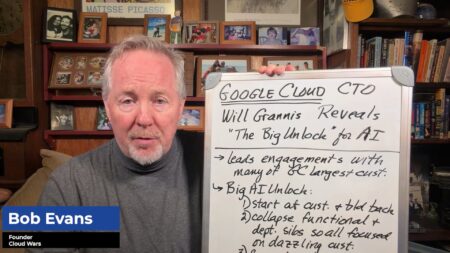“Technology is only as good as the people who can use it well” is a phrase we’ve heard frequently over the past three decades spanning the PC, Internet, and mobile automation eras. For all the concerns and challenges, each of these technologies has helped businesses and their workers progress in the long run.
According to the US Bureau of Labor Statistics, worker productivity has increased by 1.5% per year over the past two decades. From 2000 to 2022, employees produced about 60 percent more “stuff” while only increasing their work hours by 10 percent.
As AI takes center stage, the topic dominating business and tech agendas, it feels like déjà vu all over again. And, like past tech innovations, I believe the threat of AI reducing jobs is overhyped. In fact, in the latest U.S. jobs report for January 2024, we saw 353,000 new jobs added, with healthcare, government, professional services, and retail trade jobs leading the way. The unemployment rate remained at 3.7% from the month before. It’s the 24th consecutive month that the nation’s jobless rate has been under 4%.
AI will change the nature of work and the skills required for all workers. Like in the manufacturing, steel, and media industries impacted in recent automation eras, AI-powered machines will play a significant role in getting work done faster and often cheaper.
AI will have a meaningful impact on businesses and careers, so let’s explore the AI skills that businesses will require of their employees and the AI-specific roles and opportunities emerging for workers. This analysis is inspired by learnings from an AI workshop on the “future of work” I attended in December. We’re applying a proactive, positive approach to harness AI’s innovation and transformation impact.
Critical Skills in the AI Era
Professionals must uplevel their technical and non-technical skills to leverage AI in a business environment. The “soft” skills are critical as AI adoption proliferates and becomes mainstream within businesses. Here are some critical skills that will keep workers relevant and valuable in the AI era:
- Curiosity and comfort with the unknown: AI is new, but it is also in huge demand. The professionals who dive in to understand and experiment with AI applications, technologies, and models will have a distinct advantage. There is both a first-mover advantage and a compound effect of your AI knowledge. Unique AI knowledge and skills provide career opportunities to work in the most exciting areas of the business. And because of the tsunami of new AI, machine learning, and natural language processing products being launched, curiosity to test and increase knowledge will be a significant differentiator in your peer group.
- Critical thinking to challenge and activate AI outputs: AI and machine learning are powerful tools but they are only as good as humans’ ability to grasp and understand what to do with the data generated. AI and its models are processing and producing data at a rate 200% faster than just a few years ago. But the difference maker is how to interpret and act on all that data.
- Storytelling to break through the sea of AI-generated content: As generative AI (GenAI) and machine-learning-generated copy, content, and images proliferate, the ability to humanize and differentiate your brand, product, or point of view is paramount. GenAI is pretty good at creating volumes of content, but like any stand-out story, it requires a human storyteller to put the pieces together. AI plus storytelling skills, when fused, will deliver speed, volume, and impact.
AI-Influenced Roles
You don’t have to be a data scientist or a robot engineer, although those sound cool. AI will create a new need for skilled professionals who can manage and get the best out of AI. In addition, entirely new job categories and descriptions are being created daily. Here is a starter list of those roles you may want to consider adding to your team — and to evaluate for your next career move:
- AI Trainer/Learning and Development: This is an immediate need within companies: professionals who can refine AI models, as well as train and coach employees on maximizing AI use and impact. Their tasks range from feeding data to the AI to fine-tuning its outputs to ensure accuracy and relevance.
- AI Prompt Engineer/Developer: Prompt engineers are experts at getting GenAI applications, like ChatGPT, to deliver a specific output. As such, rather than being experts in programming, prompt engineers need strong communication skills, attention to detail, critical thinking, and they must be data savvy.
- AI Input-Output Manager: This role, overseeing the information being uploaded to GenAI systems and the outputs that AI systems deliver, is essential as companies navigate AI bias along with copyright, explainability, and privacy concerns.
- AI Content Editor/Auditor: Human reviewers and editors must assess content quality, accuracy, and appropriateness. In addition, organizations will need talent that can take AI-generated content and infuse stories with a company’s brand voice. This may be an ideal career opportunity for writers, content marketers, reporters, and journalists.
- AI Compliance/Ethics Professional: Developing AI governance and frameworks, and ensuring compliance and enforcement, is an immediate opportunity. There’s a clear need for professionals who can ensure that these systems are developed and used ethically, without bias, and in socially responsible ways. And with government and industry regulations coming, talent is needed to navigate and enforce compliance.
Final Thoughts
Now is the time to use AI to accelerate your business and career. At some point, AI, machine learning, natural language processing, and large language models won’t be new or differentiating; they will be the norm. Every pro will have access to tools. Like all tech and data, the differentiators will be what you do with it: how you apply it and the results you create. By mastering these skills and planning for new roles now, leaders can successfully navigate the intersection of AI and business to drive innovation, business growth, and careers. That’s a powerful trifecta!










